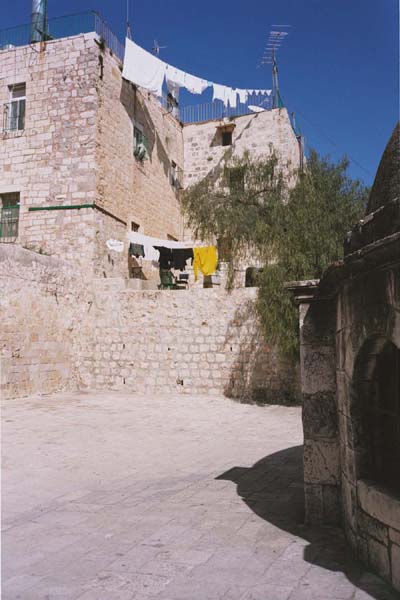|
A
Sister Pleads For Peace Through Tears
|
|
by
Eugenie Larson
|
Jamile Akway, 42, sits with her eyes downcast, staring intently at her hands. With her right index finger and thumb she gently twirls the gold and silver ring on her left ring finger around and around and around.
"Omar was going to give this ring to the girl he wanted to marry," she says softly without looking up. "Now I never take it off."
Jamile's brother, Omar, was one of the 13 Arab-Israeli citizens killed during the demonstrations that broke out in several Arab towns in October last year. The demonstrations were a show of solidarity with the Palestinians, who they viewed as the real victims of the violence that had erupted after the peace negotiations broke down in September. Nazareth, where Omar and two other Arabs were shot and killed, was the site of some of the worst clashes between Arabs and Jews.
Downtown in
the mayor's office, a colorful postcard with a picture of Omar, a good-looking
man in his forties, is propped up on top of the bookcase next to postcards
of Wisam Yezbek, 26 and Iyad Lubani, 28. Along with the shell-casings
and bullets that the mayor keeps in an envelope on a shelf, the pictures
are a constant reminder of the tragedy the town has recently suffered.
 |
Up on the hillside, in a house on the outskirts of town, Jamile sits in the living room of her neighbor, Rabei Ibrahim, looking at the same picture. Five months after his death, she still cries at the mention of her brother's name. As Rabei's mother serves her squash stuffed with rice and meat, and strong Arabic coffee, Jamile recalls the night when Omar was killed.
On October 8th, Omar left the house he shared with his sister at 9:10 p.m. He said he was going to the bakery/coffee shop where he worked. At 9:25, Jamile received a phone call from someone who told her that her brother had been shot.
"I didn't believe it!" she says shaking her head. "I told them that my brother was at the bakery drinking coffee with some friends. How could he have gotten shot in just 15 minutes? My brother was not a troublemaker!"
But Omar did go to the demonstration. Rabei, who is translating Jamile's whispered, Arabic words into English, explains that the spot where the demonstrators had gathered could be seen from the bakery.
"Omar knew that he had relatives near there, and he went to help them," he says. "He went to help them. He never planned to demonstrate."
Earlier in the evening, hundreds of Jews from Upper Nazareth had come to riot in the Arab part of town, and clashed with the Arab residents. According to Rabei, the large police force that had tried to keep the two groups apart had managed to separate them, and then opened fire on the Arabs.
"They treat Arabs as animals," Rabei says. "When Jews demonstrate, they might use water or tear-gas. But when Arabs - Israeli citizen's -demonstrate, they use machine guns!"
Thousands of people took to the streets to show their disgust with the Israeli government after the shootings. However, the special police team set up by Barak to investigate the deaths of the two Nazareth residents killed on October 8th ( Iyad Lubani died in another demonstration on October 2nd) reached the preliminary conclusion that they had accidentally been shot by fellow demonstrators.
"According to our investigation, the shots came from the direction of the Arab demonstrators," Commander Waldman told the Israeli paper, Ha'aretz in November.
"Possibly, they were accidentally fired by someone unskilled in handling guns, causing the deaths and injuries."
This explanation was, however, not accepted by the Arab-Israeli public, and investigations are still going on. Rabei thinks that the conclusion reached by the police team is one of many examples that Israel doesn't really want peace.
"We want peace," he says, nodding towards Jamile, who is still caressing the ring on her finger.
"When she was interviewed right after Omar was killed, she stood in front of the cameras and cried. The only thing she said, was, 'I want peace between Israelis and Arabs!' That's all she said."